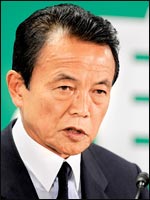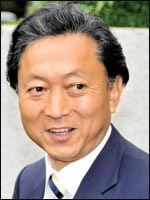Japan heading for two-party system
Richard Smart
The voters have spoken, and the Liberal Democratic Party (LDP) has
been ousted in favour of the Democratic Party of Japan (DPJ). But now a
relatively young political organization has the task of attempting to
govern a country crippled by an economic crisis and the grayest
population on the planet.
Final count from TV Asahi showed the DPJ won 308 seats out of the
total of 480, compared with the LDP’s 119.
In its manifesto, DPJ leader Yukio Hatoyama says he wishes to build
“a society where each and every person’s life matters, a society in
which people view others’ happiness as their own.” This task will be
easier said than done, though for the first time, Japan seems to be on
the road to a two-party system.
|

Taro Aso |
|

Yukio Hatoyama |
While the LDP is projected to suffer devastating losses, and is
likely to win around 100 seats, it will likely remain the opposition,
and will have an opportunity to make up ground next summer.
Two party system?
“It’s far too soon to write the obituary for the LDP,” says Jeff
Kingston, a professor of Asian studies at Temple University in Tokyo. “I
think that voters are fickle and their party loyalty is very fluid at
the moment. The biggest reason not to assume that suddenly the DPJ is
going to become the dominant party is that if you look at the polls,
clearly people are voting for change for leader they don’t like that
much.”
During the election campaign, while Aso and the LDP experienced huge
disapproval ratings, a few were willing to say that they had faith that
the DPJ would be able to deliver on the promises it made in its
manifesto. A lot of voters interviewed by Xinhua on Sunday also
expressed hesitation.
Proving that the DPJ can make good on at least some of its promises
will be the main goal for the DPJ in its first months in power. “Given
that a lot of people have been disappointed by the LDP Government of the
past several years, it would be nice to see some of the DPJ campaign
promises come true, sooner rather than later,” says Koichi Nakano, a
professor of politics at Sophia University.
Nakano, however, does see serious risks for the DPJ over the next
year. “The worst case scenario is for the DPJ to start to fall apart,
even after they come to power, and that’s not entirely impossible given
that there is an upper house election coming next year, which will be
very important.
“It is conceivable that some of the groups within the DPJ, based on
party differences, will want to pull the party this way rather than that
way. But a party political re-alignment would not be a good idea as it
would be tantamount to betraying the voters.”
The puppet master?
Much has been made of the role that Ozawa will play once the DPJ
settles into its new role as the governing party. As the leader of the
Isshin-kai, the largest faction of politicians within the DPJ, Ozawa, so
the argument goes, may be able to wield more influence than Hatoyama.
Critics have also pointed to Ozawa’s skill for making backroom deals,
seen in 2007 when he discussed a deal with then Prime Minister Yasuo
Fukuda to create a grand coalition including both the DPJ and LDP, as
further evidence that Ozawa may possess more power than he should.
Ozawa dismissed these claims and called the ideas “made up by the
media” at a news conference on Sunday.
Nakano, however, disagrees with the view that Ozawa will hold all the
cards, though he does believe he will wield some power.
“ Given that Ozawa is engineering the campaign, and has been for a
couple of years now, he is likely to come out of a good electoral
victory powerful,” he says.
“This is not to say that Ozawa is the puppet master and Hatoyama the
puppet, given that the DPJ has been run by a collective leadership
rather than a one man show already for some time, and the division of
labour is such that already Ozawa has been entrusted to the electoral
campaign and the running of the pa
rty, at least for now.”
Observers and voters alike, however, will be watching Ozawa’s moves
very closely over the coming months.
|

Straightening up of the economy, a key issue of the election
campaign. AFP |
Along with Ozawa, senior positions are also expected to go to Naoto
Kan and Katsuya Okada, other senior figures who have been instrumental
in steering the party to power over the last few years.
What happens to the LDP?
Having suffered a humiliating defeat, it is likely that the LDP will
be in turmoil for a few weeks. However, once the dust settles, what
shape will the party take?
Aso stated on Sunday that he would take responsibility for the
defeat, and so it is all but certain that he will not be the leader of
the party. A number of senior party figures also lost their seats,
including former Finance Minister Shoichi Nakagawa, meaning the LDP will
have fewer reputable politicians to choose from to take senior posts.
“The LDP is running out of political talents. They may come out with
a stop-gap leader until they can put things back together again,” says
Nakano.
“Or they may come up with someone rather unexpected and surprising.
One of the names mentioned as a possible leader at the moment is
(Health, Labour and Welfare Minister Yoichi) Masuzoe, who isn’t even a
member of the lower house, he’s in the upper house. That would be quite
a novelty for a major party leader.”
Temple University’s Kingston, however, rang a positive note about the
future for the party.
“The LDP will be what an opposition party should be. They will
scrutinize the policies of the ruling party and call them out when they
disagree. I think that is what is valuable in a democracy, is to have an
opposition that opposes.”
Hidden treasure?
How effectively it can do this will likely be based on a number of
factors: the policies the DPJ implements, the state of the economy and
how individuals in the DPJ handle public scrutiny to name a few.
The main aim of the DPJ has been to eliminate wasteful spending that
it believes there is plenty of within the LDP budget and to create a
more effective style of governance in which bureaucrats answer to the
Government, not the other way around.
There is however, a lot of doubt that the DPJ’s estimates in its
manifesto it states it aims to free up trillions of yen are unrealistic.
“I would imagine the DPJ budget is somewhat overly optimistic and so
criticism directed to the DPJ on that front is mostly justified,” says
Nakano.
Kingston agrees: “I do not doubt for a moment that there is a vast
amount of wasteful spending. There is a lot of fat to trim. I don’t
believe there is as much as the DPJ claims, I don’t think they will find
enough to cover their spending bills.”
Both agree that this will likely lead to a reallocation of spending
from public-works projects and into social-welfare programs. “It will
likely be welcomed if the DPJ reviews the spending priorities of the
Government,” Nakano says.
While short-term support for this is likely, what this will mean for
Japan in the long term is a question that is more difficult to answer,
and the DPJ’s manifesto provides few answers. It states that money will
be allocated to local governments to spend as they please, and pledges
to decentralize decision-making, but there is a lack of details in this
area that will take years, not months to work out.
The same could be said of the plan to take power from the
bureaucrats, long the staple of Japanese politics.
As Kingston points out: “Maybe the LDP will make up ground in the
upper house elections next year, after all, the party is handing the DPJ
a poison chalice with the economy in trouble.
If the DPJ doesn’t turn the economy around, voters could turn against
it in the upper house elections. We could end up with another divided
Parliament.”
Xinhua |



